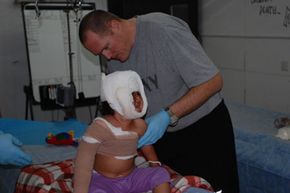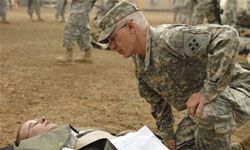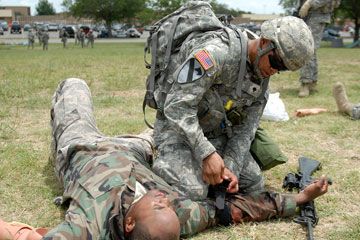In the U.S. Army, new enlistees who want to save lives on the battlefield may find their calling as health care specialists, also known as combat medics (68W), or "68 Whiskeys" in Army parlance.
While there are other health care positions available in the Army, you'd be hard-pressed to find a military occupational specialty (MOS) as exciting (and dangerous) as that of the combat medic.
Advertisement
While any enlistee with the willingness and aptitude can become a combat medic, ideally these candidates will possess strong communication skills, empathy, attention to detail, an interest in the sciences (especially biology and anatomy) and the ability to handle lots of stress under the most trying of circumstances.
Enlistees who choose this MOS are far from alone -- 35,000 health care specialists make 68 Whiskey the second-largest MOS in the Army. The only MOS with more soldiers is infantry [source: Parsons].
Medics attend basic training like any other soldiers. After the roughly 10-week basic training has been completed, combat medics go to Fort Sam Houston in Texas for 16 weeks of advanced individual training (AIT), which includes the following:
- A rudimentary six-and-a-half week introduction to medicine
- Seven different modules (such as anatomy and physiology)
- Qualifying as Emergency Medical Technician-Basic (EMT-B)
- Trauma care, how to assess a casualty and how to transport a casualty
Once combat-medics-in-training have passed the initial National Registry of Emergency Medical Technician, the training and study becomes more in-depth. One week will be spent learning basic sick-care procedures, such as taking medical histories, performing basic physical exams and identifying common problems that develop in the respiratory, digestive system and musculoskeletal systems.
Medics then spend the next seven weeks studying "battlefield medicine." They'll learn how to stop bleeding using hemostatic agents, pressure bandages and tourniquets, and they'll also train to maintain an airway, perform emergency surgical airway procedures, treat shock, start IV lines and give fluids. They'll study the best ways to provide immediate treatment for head, chest, abdominal and spinal cord injuries -- the types of injuries that are most common in combat operations.
Upon graduation, about 75 percent of the 68 Whiskeys will be assigned to maneuver units, meaning infantry, armor or artillery. And these aren't units that lurk in the background when the bullets start flying, as we'll learn in the next section.
Advertisement


